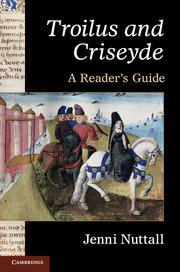Book III
Published online by Cambridge University Press: 05 January 2015
Summary
Lines 1 to 49: the proem
The proem takes the form of an invocation to Venus, goddess of love (though she is not named directly but via a cluster of astrological and mythological epithets). As the source of this proem, Chaucer adapts part of the joyful song sung to Pandaro by Troilo in the days following the consummation of his affair with Criseida (see Fil.iii.74–9). The narrating voice invokes Venus as the blessed light whose shining beams decorate the third celestial sphere (see p. 191). He calls her the sun’s beloved (because the planet Venus appears close to the sun in the morning and evening) and the daughter of Jove (another name for Jupiter, supreme deity in the classical pantheon). He celebrates her as one who is graciously kind and always ready to return to noble hearts. (The implication is that Venus’s proper home, to which she is always keen to return, is the hearts of those noble enough to experience love.) He also calls Venus the true cause of prosperity and joy. He praises her power and her favourable influence on the world which is felt everywhere, in heaven and hell, on sea and on land. All of nature at different times experiences Venus’s eternal influence (the ever-present way in which the planets were thought in medieval astrology to affect worldly matters). Indeed, God himself loves and will deny nothing to love (that is, He does not hinder or resist Venus’s effects in any way). There is no living creature in the world who is of any value without love or who can endure without love.
- Type
- Chapter
- Information
- 'Troilus and Criseyde'A Reader's Guide, pp. 71 - 110Publisher: Cambridge University PressPrint publication year: 2012



